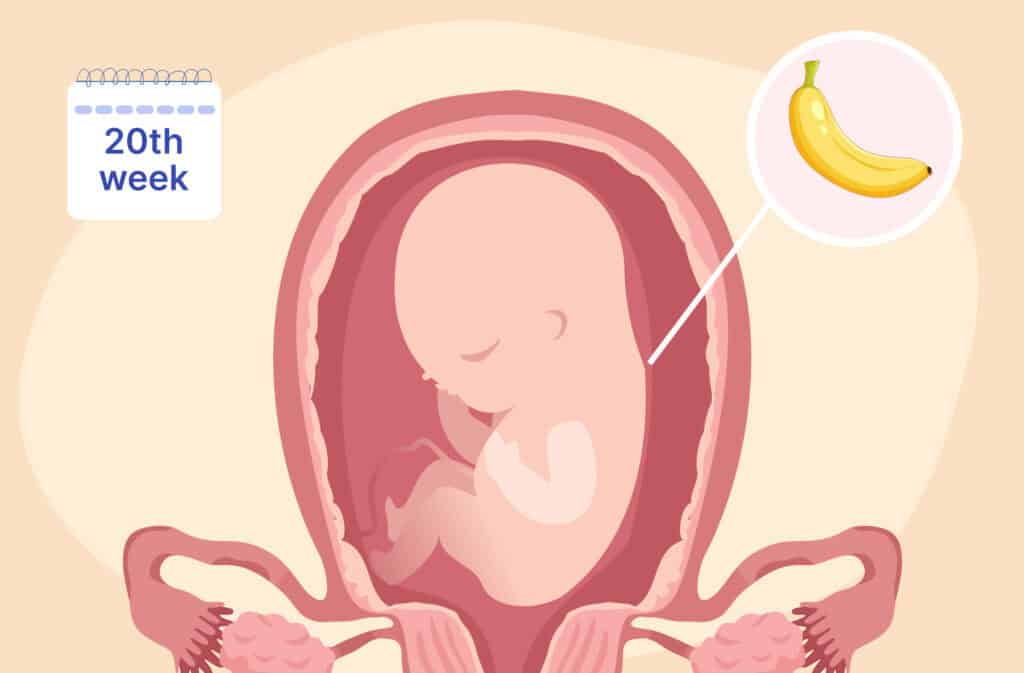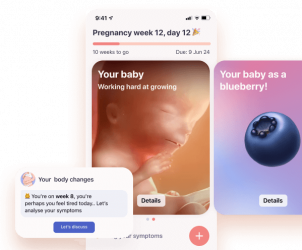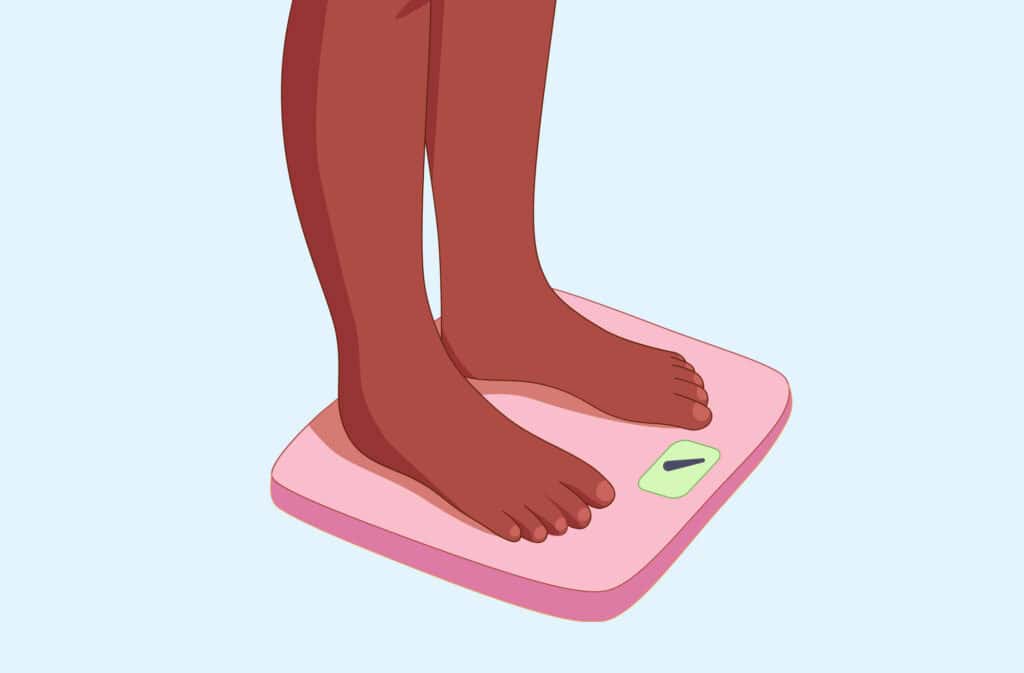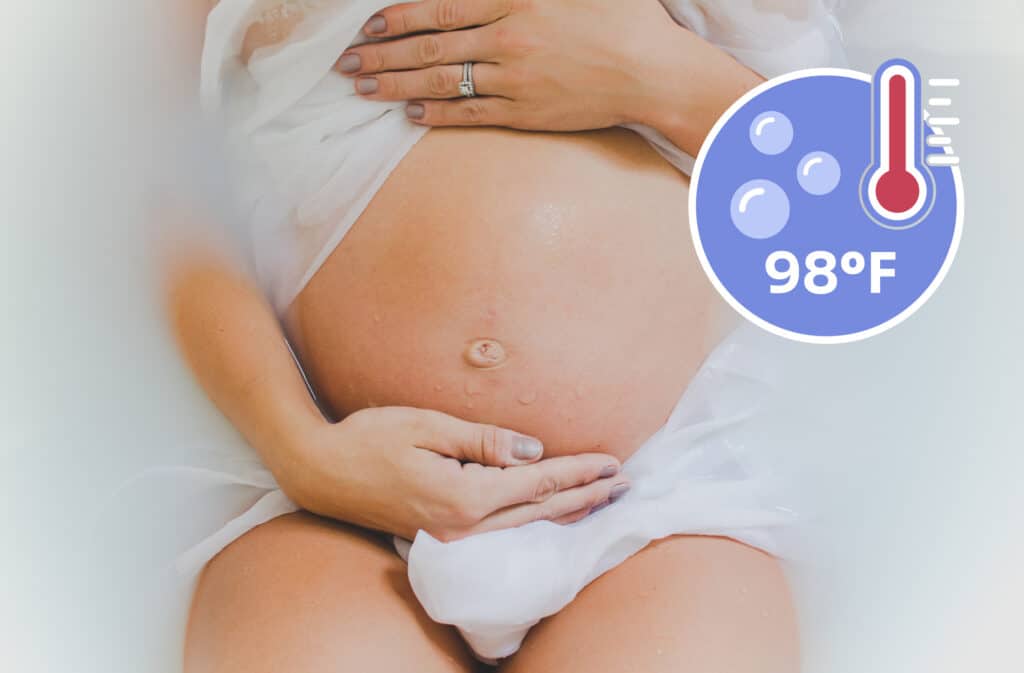Femia > Health Library > Pregnancy > Pregnancy week by week > Halfway there: Insights on being 20 weeks pregnant and fetal development
Halfway there: Insights on being 20 weeks pregnant and fetal development

- Updated Feb 27, 2025
- Published
CRAFTED BY HUMAN
Crafted by human At Femia, we provide accurate and up-to-date information at every stage of your journey, from trying to conceive, pregnancy and postnatal support. All content is created by a real person based on in-depth research and own professional experience. Femia ensures that you will receive expert advice, strict accuracy and a personalized approach from our authors/medical experts. Learn more about our editorial policy.
FACT CHECKED
Fact checked At Femia Health, we maintain the highest standards of editorial excellence in delivering content focused on helping you conceive, guiding you through pregnancy, and supporting you postpartum. Explore our content review principles to learn how we ensure the accuracy and quality of our health and lifestyle tips for every stage of your journey.
At 20 weeks pregnant, you’re halfway through your pregnancy journey. Your baby is growing quickly, reaching about the size of a banana, and you may feel more distinct movements. This week’s detailed ultrasound offers a closer look at your baby’s development and position.
Congratulations on reaching 20 weeks pregnant—you’re officially halfway through your pregnancy! This week marks an exciting milestone as your baby continues to grow and develop. This is also the time for the detailed mid-pregnancy ultrasound, where you can get a closer look at your baby’s progress. Let’s explore what’s happening this week, from fetal development to symptom management and self-care.

Pregnancy symptoms at 20 weeks
Week 20 can bring a mix of physical and emotional changes. After 20 weeks, certain pregnancy complications may be diagnosed such as preterm labor, gestational diabetes, or preeclampsia. Here are some common symptoms at this stage:
Itchy skin
As your belly and breasts expand to accommodate your growing baby, itchy skin can become a common issue. Many women experience this sensation as the skin stretches. To soothe the itch, try applying moisturizers regularly, using cold compresses, and avoiding scratching. If itching becomes severe, consult your healthcare provider, as it could be a sign of a more serious issue.
Restless sleep
Struggling to find a comfortable sleeping position is common during pregnancy. A helpful tip is to sleep on your side with your knees bent, and place a pillow between your legs for extra support. Adding pillows behind your back and under your belly can further ease pressure and improve comfort. A pregnancy pillow might also help you get better rest.
Hair and nail changes
During this stage of pregnancy, you may notice your hair becoming thicker and your nails growing faster. This is because estrogen extends the growth phase of hair, leading to less hair shedding. While this is a positive change, expect to experience some postpartum hair loss a few months after birth. Nail changes are also common, with some women noticing stronger nails, while others may find their nails are softer or more brittle.
Lower back pain
As your uterus grows, it can place extra strain on your back and muscles. This, combined with changes in your ligaments and joints, can lead to lower back pain. To alleviate this discomfort, engage in exercises like weight training and stretching to strengthen core muscles and improve flexibility. Swimming can also help relieve strain, while using heat or cold packs and prenatal massage may bring additional comfort.
Constipation
Constipation is another common issue during pregnancy, often caused by hormonal changes and a growing uterus. Along with the discomfort of constipation, hemorrhoids can also develop. To combat constipation, stay hydrated, eat a fiber-rich diet, and exercise regularly. If necessary, your doctor may recommend stool softeners or magnesium supplements to help ease the issue.
👉Find out more: Week 19 of pregnancy: What’s happening with your baby and bump
Your body at 20 weeks pregnant
At 20 weeks, your baby is growing rapidly, and your body is adjusting to these changes. Your uterus is now at or just below your belly button, creating a more prominent bump, and you may begin to notice a small, but noticeable roundness in your abdomen. Some women may also experience weight gain and develop stretch marks as their skin stretches to accommodate their growing baby.
With hormonal changes in full swing, your skin may feel drier than usual, so it’s a great idea to stay hydrated and apply moisturizer regularly. This is also a good time to focus on balanced nutrition to support both you and your baby. It’s important to monitor your weight gain during this phase to ensure it aligns with healthy pregnancy guidelines. Consider checking in with your healthcare provider during this milestone to review your overall health and progress as you reach the halfway point of your pregnancy.
20-week pregnant belly
By week 20, your belly may feel firmer and more rounded, with a prominent bump as your uterus expands upward. Many women find that maternity clothes are more comfortable by this stage, and your growing bump may attract attention from friends and family excited for your journey.
Baby development at 20 weeks
At 20 weeks, your baby’s growth is marked by increased muscle development and improved coordination. They’re practicing essential reflexes and may be more active, especially in response to external sounds. Their senses are also developing, allowing them to hear your heartbeat and the muffled sounds of your voice.
- Baby hiccups. If you feel rhythmic, jerky movements in your belly, it’s likely your baby having a case of hiccups, which is perfectly normal. Most expectant mothers begin to notice these little movements between 16 and 22 weeks, often alongside other fetal movements. Though it may feel strange, baby hiccups are just another sign that your little one is developing and active.
- Your baby can taste. At this stage, your baby’s taste buds are becoming functional, allowing them to sense tastes. As your baby swallows amniotic fluid, it’s infused with the flavors of the foods you eat, which pass through your bloodstream. While it’s still unclear if babies can actually “taste” these flavors, some studies suggest that your dietary choices could influence your baby’s food preferences later in life.
20-week baby size
The 20-week baby size is around 6.5 inches long and weighs approximately 10.5 ounces, comparable to the size of a banana. This week marks a period of rapid growth as your baby continues to develop essential systems and functions.
20-week ultrasound
The 20-week ultrasound is often called the anatomy scan, providing a detailed look at your baby’s organs, spine, and limbs. During a 20-week ultrasound 3D or 4D scan, you may see a clearer view of your baby’s face, hands, and feet. The ultrasound technician may also be able to confirm your baby’s gender if you choose to find out. This scan is an important milestone, allowing healthcare providers to ensure your baby is growing and developing well.
Position of a baby in the womb at 20 weeks
At 20 weeks, your baby still has plenty of room to move, so their position can change frequently. The baby may be head-down, breech, or even sideways. As pregnancy progresses, the baby’s position will become more consistent in preparation for birth.
Tests to expect at 20 weeks of pregnancy
- 20-week anatomy scan: A comprehensive ultrasound that provides detailed insights into the baby’s development, including heart, brain, spine, and other vital organs.
- Regular checkups: Expect a check on your blood pressure, weight, and urine to monitor for signs of preeclampsia or infection. As your pregnancy advances, your office visits may become more and more frequent as you approach the term.
- Fundal height measurement: Your healthcare provider may start measuring fundal height, which assesses fetal growth by measuring from the pubic bone to the top of the uterus.
👉 Find out more:
What to know at 21 weeks pregnant: Symptoms & baby size
22 Weeks pregnant: Fetal development, body changes, and key insights
Health tips and self-care at 20 weeks pregnant
Balanced diet for you and baby
At 20 weeks, you’re at the halfway point, and it’s essential to focus on fueling your body with a nutrient-rich diet. Make sure to include lean proteins, whole grains, and a variety of vegetables to support your growing baby. Add calcium-rich foods like dairy, fortified plant-based milks, and leafy greens to support bone development, as well as iron-rich foods like spinach, beans, and lean meats to maintain healthy blood flow.
Stay active with light exercise
While your body is undergoing significant changes, staying active can help you manage discomfort and maintain muscle strength. Activities like walking, swimming, or prenatal yoga are great choices to stay fit without overexerting yourself. These exercises help reduce the risk of excessive weight gain, promote better circulation, and improve mood.
Hydration and skin care
Hydration is key to maintaining your energy levels, supporting healthy digestion, and keeping your skin supple. Aim to drink plenty of water throughout the day, especially as your blood volume increases during pregnancy. Additionally, applying a rich, fragrance-free moisturizer can help soothe dry, itchy skin caused by stretching, especially around your belly and breasts.
Rest and relaxation
As your baby grows, so does your energy expenditure, so make sure to prioritize rest. Aim for at least 7-9 hours of sleep each night. If you’re having trouble sleeping, try using pillows to support your body or sleep on your side to improve circulation. Taking breaks during the day for relaxation, such as gentle stretching or deep breathing exercises, can also reduce stress and help you recharge.
Check-in with your healthcare provider
At this stage, it’s important to attend your routine check-ups to ensure both you and your baby are doing well. During these visits, your healthcare provider can monitor your weight gain, assess your blood pressure, and discuss any concerns you may have regarding your pregnancy. This is also a great time to discuss any symptoms you’re experiencing and ask questions about what to expect in the coming weeks.

Questions from the Femia community
How to deal with stretch marks?
Using a pregnancy-safe moisturizer daily can help with itchiness and dryness, but stretch marks are largely determined by genetics. Staying hydrated and eating nutrient-rich foods may also support skin health.
How to know if my weight gain is okay? How much should I gain?
Most women gain about 10-12 pounds by the 20-week mark, but this varies. For a basic check, you can also use a pregnancy weight gain calculator. Consult your healthcare provider to ensure your weight gain aligns with your specific health needs and pregnancy goals.
How often should I feel baby movements?
Baby movements vary, but many women notice them more regularly around week 20, especially after meals or during quiet times. Movements will become more consistent as pregnancy progresses.
What should I not do at 20 weeks pregnant?
At 20 weeks pregnant, focus on maintaining a balanced diet, staying hydrated, and engaging in light exercise like walking or prenatal yoga. It’s also a good time to check in with your healthcare provider and discuss any concerns. Also, avoid alcohol, smoking, and excessive caffeine, as these can negatively impact your baby's development. It's also important to avoid high-impact exercises that may strain your body, excessive stress, and neglecting prenatal care appointments. Always listen to your body’s signals for relaxation.
The bottom line
At 20 weeks pregnant, your baby is developing more refined movements and senses, and you may feel kicks more distinctly. Your body is adapting to these changes with a growing belly and new symptoms. You can track your pregnancy using an app, like Femia, to note your symptoms. Prioritizing a balanced diet, safe exercise, and skincare can help you manage these shifts as you reach the halfway point of your pregnancy journey.
References
- “20 Weeks Pregnant: Symptoms, Baby Development & Tips.” BabyCenter, www.babycenter.com/pregnancy/week-by-week/20-weeks-pregnant.
- “Week 20 of Pregnancy: Symptoms, Baby Development & More.” What to Expect, www.whattoexpect.com/pregnancy/week-by-week/week-20.aspx.
- “20 Weeks Pregnant: Baby Development, Symptoms & Tips.” NHS, www.nhs.uk/pregnancy/week-by-week/1-to-12/20-weeks/.
- “Pregnancy Week 20: What to Expect.” American Pregnancy Association, www.americanpregnancy.org/healthy-pregnancy/week-by-week/20-weeks-pregnant/.

Is it normal to lose weight during pregnancy? Discover the causes of weight loss during pregnancy, when to consult a doctor, and how to ensure you and your baby stay healthy.

What causes yeast infection while pregnant? Click to read a comprehensive guide with an explanation of causes, symptoms, and safe treatment options for yeast infection.

Are baths safe during pregnancy? Learn about safe water temperatures and how you can enjoy a soothing, risk—free soak.

